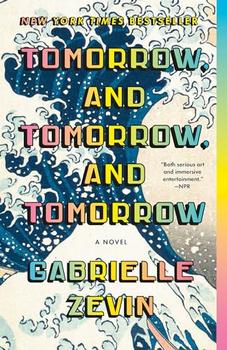Summary | Excerpt | Reading Guide | Discuss | Reviews | Beyond the Book | Readalikes | Genres & Themes | Author Bio

A novel
by Gabrielle ZevinChapter 1
Before Mazer invented himself as Mazer, he was Samson Mazer, and before he was Samson Mazer, he was Samson Masur—a change of two letters that transformed him from a nice, ostensibly Jewish boy to a Professional Builder of Worlds—and for most of his youth, he was Sam, S.A.M. on the hall of fame of his grandfather's Donkey Kong machine, but mainly Sam.
On a late December afternoon, in the waning twentieth century, Sam exited a subway car and found the artery to the escalator clogged by an inert mass of people, who were gaping at a station advertisement. Sam was late. He had a meeting with his academic adviser that he had been postponing for over a month, but that everyone agreed absolutely needed to happen before winter break. Sam didn't care for crowds—being in them, or whatever foolishness they tended to enjoy en masse. But this crowd would not be avoided. He would have to force his way through it if he were to be delivered to the aboveground world.
Sam wore an elephantine navy wool peacoat that he had inherited from his roommate, Marx, who had bought it freshman year from the Army Navy Surplus Store in town. Marx had left it moldering in its plastic shopping bag just short of an entire semester before Sam asked if he might borrow it. That winter had been unrelenting, and it was an April nor'easter (April! What madness, these Massachusetts winters!) that finally wore Sam's pride down enough to ask Marx for the forgotten coat. Sam pretended that he liked the style of it, and Marx said that Sam might as well take it, which is what Sam knew he would say. Like most things purchased from the Army Navy Surplus Store, the coat emanated mold, dust, and the perspiration of dead boys, and Sam tried not to speculate why the garment had been surplussed. But the coat was far warmer than the windbreaker he had brought from California his freshman year. He also believed that the large coat worked to conceal his size. The coat, its ridiculous scale, only made him look smaller and more childlike.
That is to say, Sam Masur at age twenty-one did not have a build for pushing and shoving and so, as much as possible, he weaved through the crowd, feeling somewhat like the doomed amphibian from the video game Frogger. He found himself uttering a series of "excuse mes" that he did not mean. A truly magnificent thing about the way the brain was coded, Sam thought, was that it could say "Excuse me" while meaning "Screw you." Unless they were unreliable or clearly established as lunatics or scoundrels, characters in novels, movies, and games were meant to be taken at face value—the totality of what they did or what they said. But people—the ordinary, the decent and basically honest—couldn't get through the day without that one indispensable bit of programming that allowed you to say one thing and mean, feel, even do, another.
"Can't you go around?" a man in a black and green macramé hat yelled at Sam.
"Excuse me," Sam said.
"Dammit, I almost had it," a woman with a baby in a sling muttered as Sam passed in front of her.
"Excuse me," Sam said.
Occasionally, someone would hastily leave, creating gaps in the crowd. The gaps should have been opportunities of escape for Sam, but somehow, they immediately filled with new humans, hungry for diversion.
He was nearly to the subway's escalator when he turned back to see what the crowd had been looking at. Sam could imagine reporting the congestion in the train station, and Marx saying, "Weren't you even curious what it was? There's a world of people and things, if you can manage to stop being a misanthrope for a second." Sam didn't like Marx thinking of him as a misanthrope, even if he was one, and so, he turned. That was when he espied his old comrade, Sadie Green.
It wasn't as if he hadn't seen her at all in the intervening years. They had been habitués of science fairs, academic games, college recruitment events, competitions (oratory, robotics, creative writing, programming), banquets for top students. Because whether you went to a mediocre public high school in the east (Sam), or a fancy private school in the west (Sadie), the Los Angeles smart-kid circuit was the same. They would exchange glances across a room of nerds—sometimes, she'd even smile at him, as if to corroborate their détente—and then she would be swept up in the vulturine circle of attractive, smart kids that always surrounded her. Boys and girls like himself, but wealthier, whiter, and with better glasses and teeth. And he did not want to be one more ugly, nerdy person hovering around Sadie Green. Sometimes, he would make a villain of her and imagine ways that she had slighted him: that time she had turned away from him; that time she had avoided his eyes. But she hadn't done those things—it would have been almost better if she had.
Excerpted from Tomorrow, and Tomorrow, and Tomorrow by Gabrielle Zevin. Copyright © 2022 by Gabrielle Zevin. All rights reserved. No part of this excerpt may be reproduced or reprinted without permission in writing from the publisher.




Everywhere I go, I am asked if I think the university stifles writers...
Click Here to find out who said this, as well as discovering other famous literary quotes!
Your guide toexceptional books
BookBrowse seeks out and recommends the best in contemporary fiction and nonfiction—books that not only engage and entertain but also deepen our understanding of ourselves and the world around us.